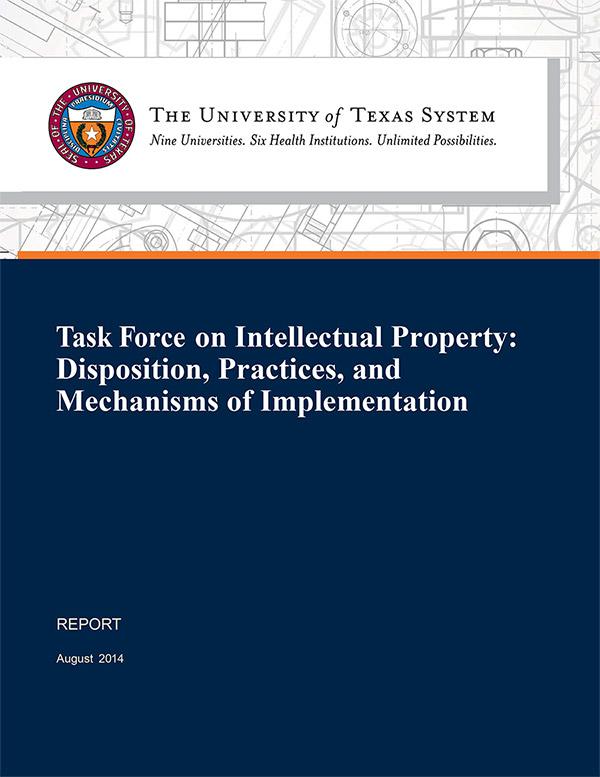The Task Force was created to evaluate the intent, rationale, current language, workability and requirements of the The University of Texas System (U.T. System) Board of Regents’ Rules and Regulations related to the disposition and management of research-derived IP at U.T. System institutions and to recommend changes or revisions of the Regents’ Rules to the Board of Regents. Five Task Force meetings were held in Austin at U.T. System from March through May, 2014. The following findings emerged over the course of these meetings.
First, the general posture of the Regents’ Rules allows for numerous types of commercialization and sponsored research arrangements as desired by the U.T. institutions. However, there are prominently stated default rules that appear to mandate ownership of IP by the Board of Regents in all cases, obscuring potential flexibility in certain limited instances. The Task Force believes this default language significantly hinders attracting the volume and depth of sponsored research partnerships that might otherwise materialize. Second, the standing of IP created by students or related to educational technologies at U.T. System institutions is not clear in the present Rules. Third, faculty and student incentives to commercialize research products could be strengthened. Fourth, institutional offices of technology commercialization may not be fully positioned to advance campus commercialization objectives. Lastly, opportunities may exist to deploy U.T. System facilities in a more aggressive fashion in connection with sponsored research than may currently be in effect. Based on these findings, this report makes seven recommendations:
- The Board of Regents’ Rules and Regulations concerning IP should be re-written to promote industry engagement and enhance brevity, simplicity of language, and clarity of intent.
- The Rules should affirm student ownership of student-created IP.
- U.T. System must strengthen faculty and student Incentives to pursue entrepreneurship. Particularly, commercialization and discovery efforts should be considered in institutional processes related to promotion and tenure.
- The current 50%-50% allocation of net license revenue required in the Rules should be re-configured so as to provide maximum flexibility to each U.T. System institution but also recognize the importance of, and maintain a balance between, multi-investigator and multi-disciplinary discovery.
- In collaboration with its institutions, the U.T. System Administration should be charged to systematically assess how to best advance, and resource, the mission(s) and functions of the institutional Offices of Technology Commercialization and each office’s process of commercialization of discovery.
- The U.T. System should evaluate and appraise strategies for using university facilities in more aggressive academic-industry partnerships within the confines of applicable I.R.S. laws and regulations. Opportunities may exist to better deploy U.T. System facilities in connection with sponsored research.
- The U.T. System Institute for Transformational Learning (ITL) should be charged with, as part of its ongoing study, an assessment of the present state of educational technology development and how IP and commercialization in this area is currently managed at each U.T. institution, and to project the future state. This assessment is required for future recommendations for IP related to education technologies, particularly distance and hybrid online learning.
Implementing these recommendations will strongly advance the discovery enterprise and enhance commercialization at all of our institutions, empower and foster


